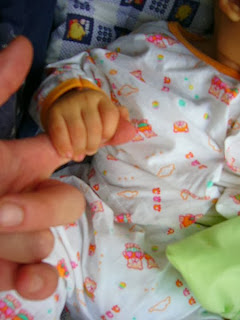Every parent looks forward to their baby's first smile and their baby's first laugh.
It is a feeling of real connection beyond the day to day routine of feeding
and changing nappies that is very special. Also laughter, like a smile,
is a communication that everyone in the whole world can understand.
At what age should my baby start to laugh? is a question asked by many parents. You can expect your baby to laugh somewhere between 3 to 6 months but keep in mind, as with all child development, most babies are different. So don't worry if your baby is not laughing at 4 months because everyone is unique and some babies just don't laugh as much as others. Please don't compare your baby to other babies, even other siblings.
What's in a Laugh?
A laugh may seem like a simple and spontaneous act but it is quite complex - it even has it's own science called gelotology. It is a brain development involved with various regions of the brain. When we laugh we use the diaphragm and parts of the respiratory system.
Laughing is a form of communication and babies will be babbling and cooing before they laugh.
Laughter consists of two parts -- a set of gestures and the production of a sound. When we laugh, the brain pressures us to conduct both those activities simultaneously. When we laugh heartily, changes occur in many parts of the body, even the arm, leg and trunk muscles. science.howstuffworks.com
You may also like this interesting article: How five-month-old babies know what’s funny
Before they speak or crawl or walk or achieve many of the other amazing developmental milestones in the first year of life, babies laugh. This simple act makes its debut around the fourth month of life, ushering in a host of social and cognitive opportunities for the infant.








.jpg)

